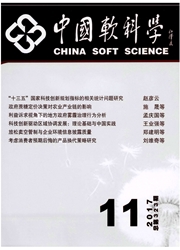

 中文摘要:
中文摘要:
本文在深入剖析“土地财政”形成的逻辑机理的基础上,利用我国2001-2007年间地级市面板数据考察了纵向财政失衡和政治晋升对土地出让金规模的影响。研究表明,纵向财政失衡对土地出让金规模具有显著的正影响,表明财权与事权错位加剧了地方政府土地财政行为。政治晋升激励亦是“土地财政”形成的一个重要原因,体现在离任后获得升迁的市委书记在任时更加热衷通过土地出让获取财政收入。在任期的最后一年。政治晋升激励的影响尤为明显。分样本分析还发现:纵向财政失衡对土地出让金规模的影响在经济较落后地区更为突出,政治晋升激励的影响则在较发达地区尤为强烈。政治晋升激励强化了纵向财政失衡对地方政府土地财政行为的影响,赋予地方更大的行政自主权则有助于矫正纵向财政失衡和政治晋升造成的地方政府土地财政行为扭曲。
 英文摘要:
英文摘要:
Based on delving into the logical mechanism with respect to the formation of the "land finance", drawn on a Chinese prefectural panel data set from 2001 to 2007, this paper evaluates the impact of vertical imbalance and political promotion on the scale of land grand fee. Our results show that vertical imbalance has a significantly positive effect on the scale of land grand fee, indicating that the mismatch between administrative and financial powers enervates the land finance activities of local governments. Another explanation to the formation of land finance is political promotion. The secretary of municipal Party committee, who gets promotion after his term, is more interested in raising fiscal revenue through land grand. The effect is especially significant in the last year of his term. When applying the decomposition strategy, we further find that effect of vertical imbalance on land grand fee is more significant in backward regions, while the effect of political promotion is more obvious in developed regions. The political promotion encouragement amplifies the impact of vertical fiscal imbalance on land finance activities of local governments. We also find that granting more administrative power to local governments helps to redress the distortion brought by vertical fiscal imbalance and political promotion.
 同期刊论文项目
同期刊论文项目
 同项目期刊论文
同项目期刊论文
 期刊信息
期刊信息
